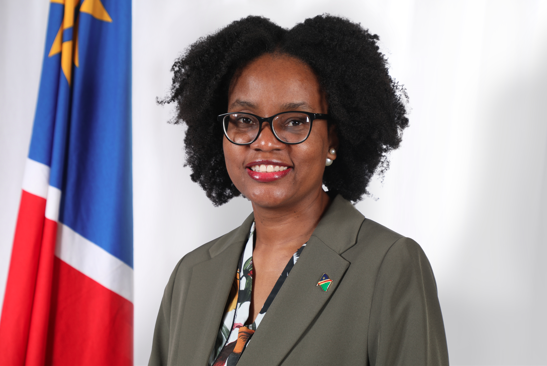
Statement by Her Excellency Ms. Julia Imene- Chanduru Ambassador and Permanent Representative of the Republic of Namibia on behalf of the African Group at the 70th Regular Session of the Trade and Development Board (TDB) - General debate, 19 June 2023
President of the Trade and Development Board, Ambassador Hashmi,
Secretary-General of UNCTAD, Ms. Grynspan,
Excellencies, distinguished delegates, ladies and gentlemen,
1. I am honored to deliver this statement on behalf of the African Group. At the outset, we align to the statement delivered by the Ambassador of Tanzania on behalf of Group 77 plus China. Secondly, congratulate you Mr. President and the Bureau on your election to preside over the work of the 70th session of the TDB.
Mr. President,
2. On the contributions made by the United Nations Conference on Trade and Development (UNCTAD) to the implementation of and follow-up to the outcomes of the major United Nations conferences and summits in the economic and social fields.
3. The African Group commends the crucial role that UNCTAD has played in promoting sustainable development through trade, investment, finance, and technology transfer.
4. We knowledge that, the organization has been at the forefront of efforts to enhance international economic cooperation and integration among developing countries and between developed and developing countries by developing a range of initiatives and programs aimed at supporting this goal.
5. Against the back drop that, UNCTAD’s work is guided by the principles of transparency, accountability, and inclusivity, which are essential for achieving sustainable economic growth for all African countries.
6. On Item 9, the African Group is deeply concerned over the snail pace implementation of the outcomes of the fifteenth session of UNCTAD, commitments made by member states (Developed) have not been fully realized, particularly in relation to the support for developing countries.
7. The statement, which was adopted in 2016, recognized the need for global economic governance reform, the importance of investment in infrastructure and industrialization, and the promotion of sustainable development. However, progress in implementing these commitments has been slow, particularly in light of the COVID-19 pandemic, which has exacerbated existing economic challenges in developing countries.
8. The African Group calls on all member states to redouble their efforts to fully implement the UNCTAD Ministerial outcomes. It is crucial that we prioritize the needs and concerns of developing countries, particularly in the current global economic climate. We also emphasize the importance of international cooperation and solidarity in achieving these goals.
9. We believe that the implementation of these outcomes will bring significant benefits to all members of the African Group, particularly in the achievement of the SDG Goals. The outcomes of the UNCTAD session focus on a range of issues, including trade, investment, finance, technology, and innovation.
10. These are critical for promoting sustainable development, reducing poverty, and achieving economic growth in Africa. We are confident that the implementation of these outcomes will help to create an enabling environment for investment and trade, which will, in turn, facilitate economic growth and development.
11. In particular, our Group is pleased with the focus on fostering innovation and technology transfer. These are critical areas for the achievement of the SDG Goals, and we believe that the outcomes of the UNCTAD session will help to create an environment conducive to innovation and technology transfer in Africa. Furthermore, we appreciate the emphasis placed on
promoting investment in sustainable development, which will support the achievement of the SDG Goals.
12. The African Group is committed to working with our partners and beyond to ensure that the outcomes of the UNCTAD session are effectively implemented. We believe that this will contribute significantly to the achievement of the SDG Goals in Africa and help to promote sustainable development in the region.
13. A more result and priorité based will be crucial in accelerating economic growth for Africa to achieve Agenda 2063 ‘‘the Africa We Want’’. For this to be achieved, UNCTAD can help African countries to develop policies that are transparent, predictable, and conducive to investment, and that provide incentives for investment in key sectors of the economy. This will help to create more jobs, increase exports, and generate more revenue for the government.
14. In addition, Our Group believes that UNCTAD can promote inclusive and sustainable economic growth in Africa by supporting the development of value chains and promoting trade diversification. Value chains can help to increase local economic development by creating jobs, increasing productivity, and promoting exports which are key in achieving SDG’s more specifically SDG 9.
Mr. President,
15. In conclusion, UNCTAD’s mandate can contribute towards sustainable economic growth for all African countries by providing policy advice, technical assistance, and capacity-building support to African countries. The work of UNCTAD should be guided by the principles of transparency, accountability, and inclusivity, which are essential for achieving sustainable economic growth.
16. UNCTAD can support African countries to improve their trade and investment policies, improve their infrastructure and access to capital, promote value chains and trade diversification, and promote sustainable consumption and production patterns. By doing so, UNCTAD can help to
unlock the vast potential for economic growth in Africa and promote sustainable development for all.
17. Finally, the African Group commends UNCTAD’s efforts and active involvement in the follow-up to major United Nations conferences and summits. We acknowledge and support a wide range of initiatives and programs aimed at monitoring progress towards the achievement of the goals and targets set out in the conference outcomes. Such contributions are a testament to the organization’s commitment to promoting sustainable development and reducing poverty and inequality around the world.
I thank you

